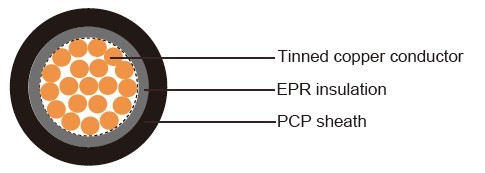National Motorway Communications System Specifications(TR Series)
TR2029-Inductive Loop Detector Cable
Application and Description
TR2029 inductive loop detector cable is a single core multistranded flexible cable sheathed with polychloroprene designed for installation in a slot cut into the carriageway. It is used to measure and control traffic flow. The cables are buried beneath the road in 'loops' and an electrical current is passed through them creating a magnetic inductive field. the vehicle passing through this field that creates a disturbance and a means by which to measure traffic flow and vehicle type. Typical applications are for traffic control signals, safety cameras, variable speed control systems, flow monitoring and access control. The cables have to be of a robust design to withstand a hostile working environment and accommodate back filling with hot bitumen during cable pulling.
Standard
TR2029, IEC 60811 and BS 6500, BS EN 60332-1-2
Cable Construction

- Conductor: Tin coated plain annealed copper, comply with IEC 60228 for Class 5
- Insulation: Ethylene propylene rubber (EPR), GP1, 85 o C, comply with BS 7655
- Insulation Color: Black
- Sheath: Polychloroprene(PCP), RS3, 85 o C, comply with BS 7655,heavy-duty, oil-resisting and flame
retardant
- Sheath Color: Black
Technical Characteristics
- Rated voltage: 450/750 volts
- Minimum bending radius: 5 x O
- Rated temperature: +90o C
- Conductor resistance at 20°C: 1.5mm2---- 13.7ohms/km
2.5mm2---- 8.21ohms/km
- Insulation resistance: >665 MO x km
- Flame retardant: BS EN 60332-1-2
Cable Parameter
| Number of Cores |
Nominal Conductor Area |
Nominal Conductor Stranding |
Insulation Thickness | Sheath Thickness | Nominal O/D | Approx Cable Weight |
| mm2 | NO./mm | mm | mm | mm | Kg/km | |
| EPR insulation only | ||||||
| 1 | 1.5 | 30/0.25 | 1.1 | - | 3.8-4.0 | 30 |
| 1 | 2.5 | 50/0.25 | 2.1 | - | 6.1-6.4 | 48 |
| EPR insulation with PCP sheath | ||||||
| 1 | 1.5 | 30/0.25 | 0.8 | 1.4 | 5.8-7.2 | 65 |

